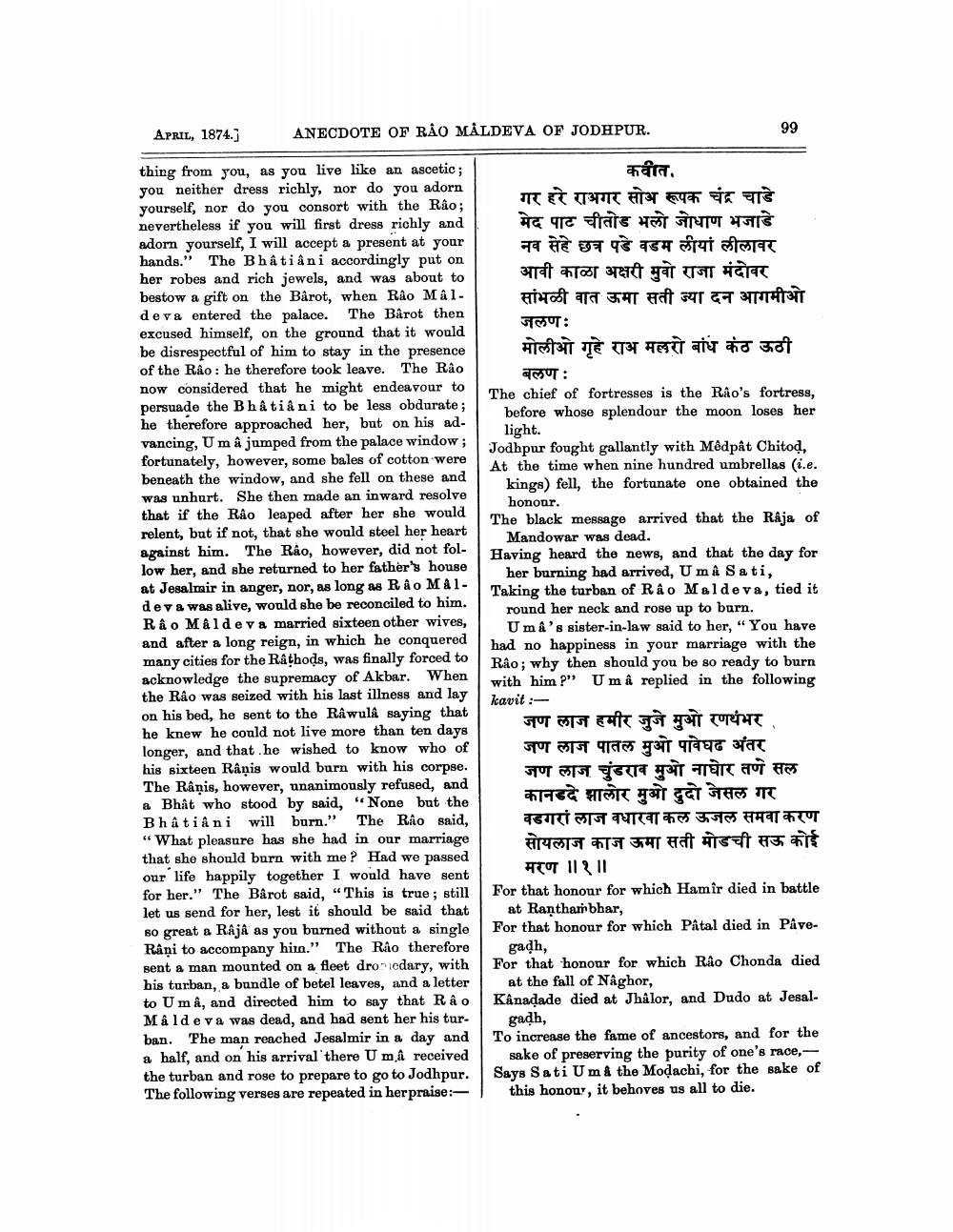________________
APRIL, 1874.)
ANECDOTE OF RÅO MÅLDEVA OF JODHPUR.
thing from you, as you live like an ascetic; you neither dress richly, nor do you adorn yourself, nor do you consort with the Râo; nevertheless if you will first dress richly and adorn yourself, I will accept a present at your hands." The Bhâtiâni accordingly put on her robes and rich jewels, and was about to bestow a gift on the Barot, when Rao Mal. deva entered the palace. The Barot then excused himself, on the ground that it would be disrespectful of him to stay in the presence of the Râo: he therefore took leave. The Rao now considered that he might endeavour to persuade the Bhâtiâ ni to be less obdurate; he therefore approached her, but on his advancing, Um â jumped from the palace window; fortunately, however, some bales of cotton were beneath the window, and she fell on these and was unhurt. She then made an inward resolve that if the Ráo leaped after her she would relent, but if not, that she would steel her heart against him. The Rao, however, did not follow her, and she returned to her father's house at Jesalmir in anger, nor, as long as Rao MAIdeva was alive, would she be reconciled to him. Râ o Måldeva married sixteen other wives, and after a long reign, in which he conquered many cities for the Rathods, was finally forced to acknowledge the supremacy of Akbar. When the Rao was seized with his last illness and lay on his bed, he sent to the Rawulâ saying that he knew he could not live more than ten days longer, and that he wished to know who of his sixteen Râņis would burn with his corpse. The Rânis, however, unanimously refused, and a Bhât who stood by said, “None but the Bhatia ni will burn." The Rio said, “What pleasure has she had in our marriage that she should burn with me? Had we passed our life happily together I would have sent for her." The Barot said, “This is true; still let us send for her, lest it should be said that so great a Rajâ as you burned without a single Râņi to accompany him." The Râo therefore sent a man mounted on a fleet dromedary, with bis turban, a bundle of betel leaves, and a letter to U mâ, and directed him to say that Rào Mâld eva was dead, and had sent her his tur. ban. Phe man reached Jesalmir in a day and a half, and on his arrival'there Uma received the turban and rose to prepare to go to Jodhpur. The following verses are repeated in her praise:
गर हरे राअगर सोअ रूपक चंद्र चाडे मेद पाट चीतोड भलो जोधाण भजाडे नव सेहे छत्र पडे वडम लीयां लीलावर आवी काळा अक्षरी मुवो राजा मंदोबर सांभळी वात उमा सती ज्या दन आगमीओ
TOUT: मोलीओ गृहे राम मलरो बांध कंठ उठी
Tour: The chief of fortresses is the Rao's fortress, before whose splendour the moon loses her
light. Jodhpur fought gallantly with Medpật Chitod, At the time when nine hundred umbrellas (i.e. kings) fell, the fortunate one obtained the
honour. The black message arrived that the Raja of
Mandowar was dead. Having heard the news, and that the day for
her burning had arrived, Uma Sati, Taking the turban of Rao Maldeva, tied it
round her neck and rose up to burn.
Uma's sister-in-law said to her, “You have had no happiness in your marriage with the RÃO; why then should you be so ready to burn with him ?” U mâ replied in the following kavit :
जण लाज हमीर जुजे मुओ रणथंभर, जण लाज पातल मुओ पावेघढ अंतर जण लाज चुंडराव मुओ नाघोर तणे सल कानडदे झालोर मुओ दुदो जेसल गर वडगरां लाज वधारवा कल ऊजल समवा करण सोयलाज काज ऊमा सती मोडची सऊ कोई
ATT II 11 For that honour for which Hamîr died in battle
at Ranthambhar, For that honour for which Patal died in Pave
gadh, For that honour for which Rao Chonda died
at the fall of Nâghor, Kanadade died at Jhilor, and Dudo at Jesal
gadh, To increase the fame of ancestors, and for the
sake of preserving the purity of one's race,Says Sati Um& the Modachi, for the sake of
this honony, it behoves us all to die.




